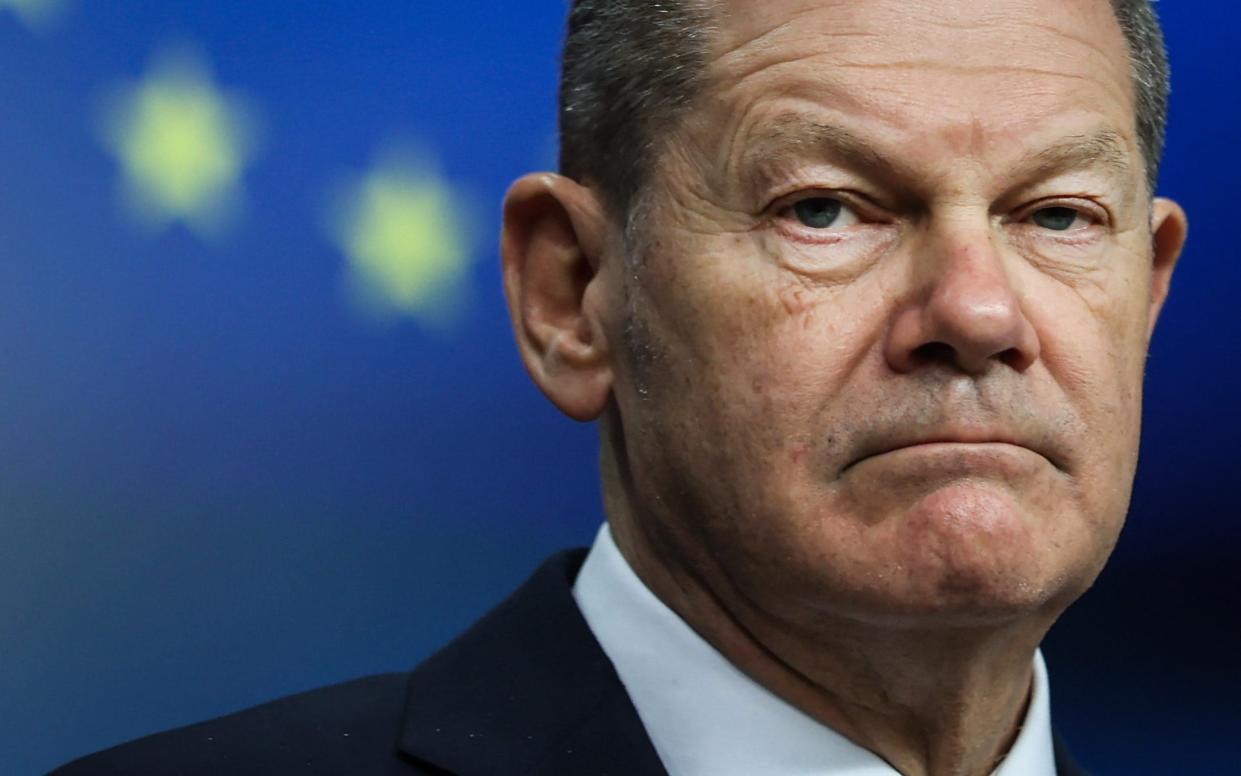Olaf Scholz accused of appeasing Vladimir Putin by ‘seeking to reset relations’ with Russia

- Oops!Something went wrong.Please try again later.
- Oops!Something went wrong.Please try again later.
Olaf Scholz, the German chancellor, faced allegations of “appeasement” and betraying his own coalition partners following reports he is seeking a meeting with Vladimir Putin to “reset” relations with the Kremlin.
Such a move would put strain on Germany's newly formed centrist government ahead of a frantic week of high-level diplomatic efforts to avert a threatened Russian invasion of Ukraine.
Foreign ministers from Nato’s member states are to hold a video conference on Friday to discuss Russia's apparent preparations for an invasion of Ukraine and Mr Putin’s demand for security guarantees, including a bar on further Nato expansion.
Joe Biden, the US president, is due to speak directly with Mr Putin on Sunday. Russian and US delegations will begin two days of talks in Geneva the same day. Finally, the Nato-Russia council will meet on January 12.
Western allies have so far presented a united front on the issue, insisting that they would all back fresh sanctions on Russia if a war was to start, and allow Mr Biden to take the lead in talks with Mr Putin.
Mr Scholz, in office for less than four weeks, has taken Russia diplomacy out of the hands of the German Foreign Ministry, held by the Kremlin-critical Green party, according to Germany’s Bild newspaper reported on Monday.
He told Mr Putin by phone before Christmas that he would strive for a “qualified reset” in relations, which have been badly frayed since the Russian annexation of Crimea in 2014, the paper reported. The Chancellor's team is reportedly trying to set up a meeting before the end of January.
Move 'would undermine Nato'
Mr Scholz's spokesman refused to comment on the report, but confirmed that Jens Plotner, an adviser to the chancellor, will meet with his Russian and French counterparts this week.
It would also be seen as undermining Nato solidarity amid the alliance's most serious standoff with Moscow since the original Russian invasion eight years ago.
“Let’s first ask why former European leaders more and more find refuge with Kremlin oligarchs? Maybe this explains why we are so weak to countering aggressor?” Linas Linkevicius, a former foreign and defence minister of Lithuania, wrote on Twitter.
He appeared to be referring to Gerhard Shroeder, a former German chancellor from Mr Scholz's Social Democratic party who accepted a job with Gazprom, Russia's state owned gas monopoly, after leaving office in 2005.
Garry Kasparov, a former chess champion turned Russian opposition politician who now lives in exile in the United States, described the move as “appeasement”, saying that “concessions to thugs and terrorists just encourage more aggression, as always”.
The moves reported in Bild would mark a snub to his Green coalition partners, who hoped to fashion a new German foreign policy based on intensifying ties between democracies and a harder line on Mr Putin's Russia.
Policy differences in Berlin are most pronounced on the issue of the Nord Stream 2 gas pipeline, which NATO allies including the UK, US, and Poland see as a Kremlin tool to undermine the security of Ukraine and other Central and Eastern European countries.
That view is shared by the German Greens, who are eager to use it as a geopolitical tool to pressure Moscow into de-escalating aggression on its western frontier.
The Social Democrats see the pipeline as a business deal and a key part of German energy policy. Angela Merkel, Mr Scholz's predecessor, resisted US pressure to cancel the project, but it has yet to win approval to operate from German regulators.

